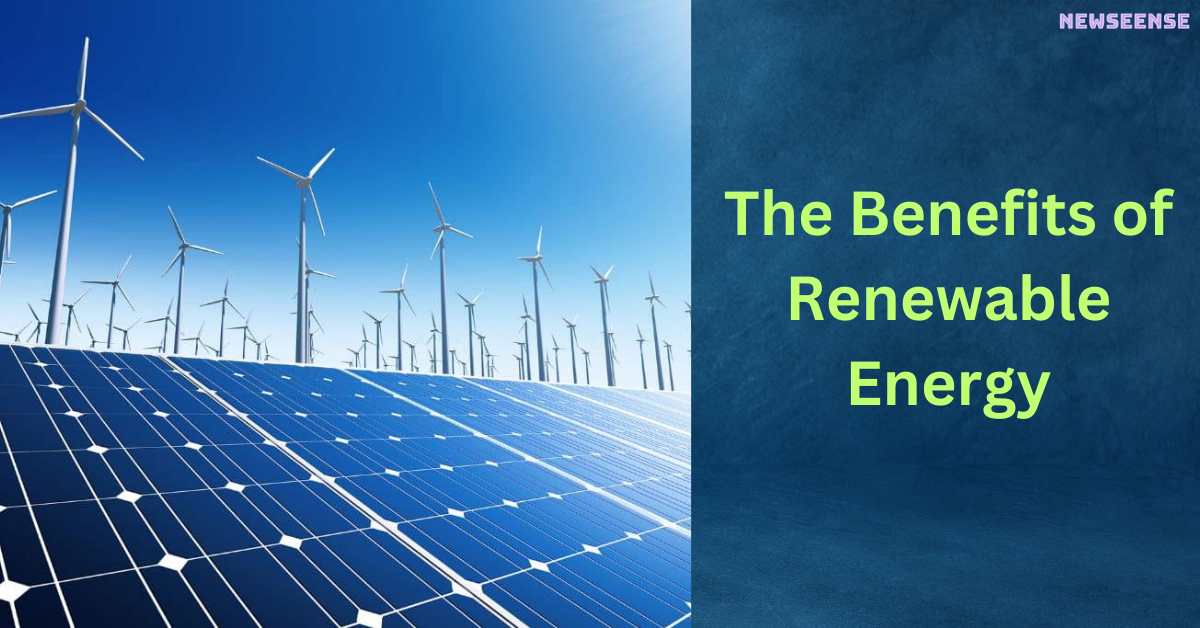
Renewable energy is energy that is generated from natural resources that are replenished over time, such as sunlight, wind, rain, and geothermal heat. The use of renewable energy has many benefits, including environmental, economic, and social benefits. In this blog post, we will explore the benefits of renewable energy in detail.

Table of Contents
Environmental Benefits
The use of renewable energy has many environmental benefits. One of the most significant benefits is that it reduces greenhouse gas emissions. Greenhouse gases are gases that trap heat in the atmosphere, leading to global warming and climate change. The use of fossil fuels, such as coal, oil, and natural gas, is a major contributor to greenhouse gas emissions. Renewable energy sources, on the other hand, produce little to no greenhouse gas emissions. By using renewable energy, we can reduce our carbon footprint and help mitigate the effects of climate change.
Another environmental benefit of renewable energy is that it reduces air pollution. Fossil fuels are a major source of air pollution, which can have negative health effects on humans and animals. Renewable energy sources, such as wind and solar power, do not produce any air pollution. By using renewable energy, we can improve air quality and reduce the negative health effects of air pollution.
Economic Benefits
The use of renewable energy also has many economic benefits. One of the most significant benefits is that it creates jobs. The renewable energy industry is growing rapidly, and it is creating jobs in manufacturing, installation, and maintenance. According to the U.S. Department of Energy, the solar industry alone employed over 240,000 people in 20201. By investing in renewable energy, we can create more jobs and boost the economy.
Another economic benefit of renewable energy is that it reduces energy costs. Renewable energy sources, such as wind and solar power, have no fuel costs, which means that the cost of generating electricity is much lower than that of fossil fuels. By using renewable energy, we can reduce our energy bills and save money.
Social Benefit
The use of renewable energy also has many social benefits. One of the most significant benefits is that it improves public health. Air pollution from fossil fuels can have negative health effects on humans and animals. By using renewable energy, we can reduce air pollution and improve public health.
Another social benefit of renewable energy is that it increases energy independence. Fossil fuels are a finite resource, and they are often imported from other countries. By using renewable energy, we can reduce our dependence on foreign oil and increase our energy independence.
Conclusion
In conclusion, the use of renewable energy has many benefits, including environmental, economic, and social benefits. By using renewable energy, we can reduce our carbon footprint, improve air quality, create jobs, reduce energy costs, improve public health, and increase energy independence. Investing in renewable energy is not only good for the environment, but it is also good for the economy and society as a whole.
Also read: https://newseense.com/10-captivating-science-facts-that-challenge-the-norm/
- BJP President JP Nadda Issues Notice to Dilip Ghosh Over Controversial Remarks on Mamata Banerjee
- Ram Charan and Kiara Advani’s ‘Jaragandi’ Song from Game Changer Released
- Pre-Match Banter: Rohit Sharma’s Flying Kiss Recreation Adds Spice to MI vs SRH Clash
- Swami Smaranananda Maharaj, President of Ramakrishna Math and Ramakrishna Mission, Passes Away at 95
- Stand-up Comedian Munawar Faruqui Breaks Silence on Social Media After Mumbai Police Detention